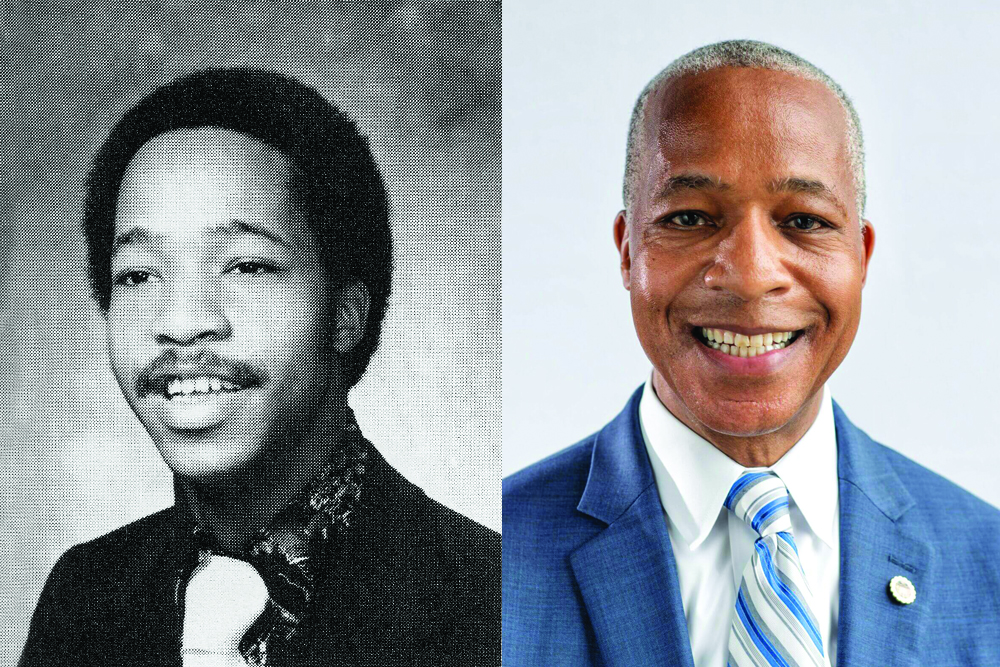"Adelphi was the right size because you can get a lot of attention there that you wouldn't get at these huge campuses with 50,000 or 60,000 students. For me, it was a very nurturing campus."

Dr. Jones in his 1982 yearbook photo (left), and in 2018, as Howard University’s vice president for research.
In July 2018, Howard University, a private research university founded in 1867, reestablished the Office of Research and appointed Bruce Jones ’82, Ph.D., to lead the effort as vice president for research.
Prior to Howard, Dr. Jones served in a number of leadership roles at the University of Houston, the University of Missouri and the University of South Florida. But his higher education journey started at Adelphi, a place he credits with being where he found his calling and gained important leadership skills, and one that is “very dear to my heart.”
Dr. Jones grew up on Long Island, in North Babylon, and chose Adelphi because his mother had received her bachelor’s degree in nursing from Adelphi and had an excellent experience, he said.
At Adelphi, Dr. Jones was active, “probably too active,” he admitted. He was a fraternity brother of current Trustee Marc Strachan ’81, participated in student government and leadership councils, and was president of the Interfraternity Council, the first African American to be elected to it, he said.
“There had been African Americans who were vice president but no one had been president in the history of the council,” he explained. “Doing that put me in political circles on campus that I normally wouldn’t have been involved with because that was a significant position. I [oversaw] quality of life issues with the students. I represented Adelphi University in community initiatives, particularly in Hempstead, and charitable events. I had the ear of the president and the dean of students. I thoroughly enjoyed it, because there were major leadership opportunities for me that impacted the rest of my life.”
One of the most memorable experiences, he said, was working with students to get residents in Hempstead and West Hempstead, particularly in the African American community, to register and vote in elections.
But Dr. Jones didn’t discover his passion for political science until senior year. “I bounced around between biology and psychology throughout most of my years at Adelphi,” he said. “In my senior year, I needed to take some courses and decided to take two poli-sci courses. Did it open my eyes! For me, the work in political science did not seem like work. I said to myself, ‘Bruce, if you go into graduate school, this is what you’re going to major in. You have found your niche.’ I just wish it would’ve happened earlier [than senior year].”
Dr. Jones did indeed pursue political science at Columbia University, receiving a Master of Arts in politics and education and a Master of Philosophy and a doctorate in political science. He then led an active career in the nonprofit sector and higher education, culminating with his recent appointment at Howard.
“I was drawn to Howard for its research and to launch the Office of Research,” he said. “I am expanding on our role as a research institution with faculty with strong research credentials in healthcare, humanities and the arts, the social sciences, governance and issues of democracy.”
Howard is also known as a preeminent historically black college or university (HBCU). “I was also drawn to Howard because of its historical significance in higher education. Chartered in 1867, its purpose in uplifting the African American community and its graduates are a who’s who of African American intelligentsia. Howard has always had a dominant presence in higher education.”
Higher education has, of course, changed since Howard was chartered. Institutions—including Adelphi—are making diversity and inclusion a priority.
“We know the intrinsic value of diversity and inclusion,” he said. “And it is also ethically the right thing to do. But it is still a work in progress. Many problems and practices concerning gender, race and ethnicity have been around for 400 years. No way would I expect, even in my lifetime, that we would arrive at a utopian nirvana after only scraping the surface at something so entrenched. It’s still a work in progress. Historically black colleges and universities (HBCUs), women’s, and Hispanic-serving institutions still play a critical role, given that we have not arrived at the point we need to be in. “
Dr. Jones has been part of many institutions, but when parents ask his advice on where to send their sons and daughters, he said he tells them about his “extremely positive” experience at Adelphi and the value of a liberal arts education at a small- to midsize school. “Adelphi was the right size because you can get a lot of attention there that you wouldn’t get at these huge campuses with 50,000 or 60,000 students. For me, it was a very nurturing campus. I felt like we were all close and we knew each other and we knew our professors and we knew our administrators. You don’t get lost in the crowd. I just treasure that experience.”
For further information, please contact:
Todd Wilson
Strategic Communications Director
p – 516.237.8634
e – twilson@adelphi.edu